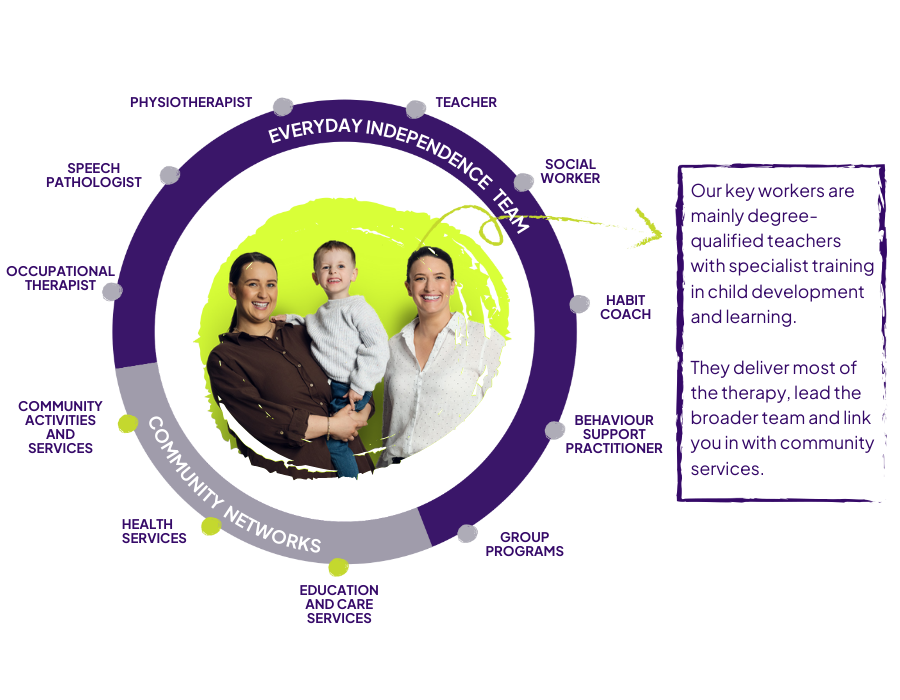Tips for parents and carers to support children to ...
Continue ReadingYour Key Worker: The Heart of Early Childhood Supports
Everyday Independence key workers, mostly trained teachers, use their knowledge of child development to help children grow socially, emotionally, physically, cognitively, and in language skills. They plan and deliver your child’s early childhood intervention services to support your child to develop their skills and lead your family’s therapy team, arranging services from the broader therapy team which may include occupational therapists, speech pathologists, physiotherapists, positive behaviour support practitioners and habit coaches.
Your key worker will be the main point of contact for your family, and will coordinate the communication and sharing of knowledge and skills between the team.

What Makes the Key Worker Model Best Practice?
The NDIS recognise the key worker model as best practice and acknowledge the many benefits to providing early childhood supports in this way.
“These practices focus on fewer, stronger relationships where the family is a true partner, and knowledge can be transferred across disciplines, and from specialists to carers and other important adults in the child’s life.” ECEI Implementation reset project report – NDIS
The Benefits of the Key Worker Model
The benefits of the key worker model include:
- Better outcomes: Consistency of practitioners and services and a personal, family centred approach results in better long term outcomes for your child and family. The key worker ensures all members of the support team are working towards the same outcomes for your child.
- A familiar face: an emphasis on less but stronger relationships with practitioners enables your child to form a bond with and learn to trust their key worker, allowing your child to reach their goals sooner. This is particularly helpful where children struggle with transitions or change.
- Tailored therapy: our key workers get to know your child on a deeper level, allowing them to personalised therapy services to your child’s individual interests to promote engagement.
- Streamlined NDIS service: Coordinating your child’s services through one person simplifies the NDIS process. From onboarding to communicating and scheduling appointments, the key worker service make everything more straight forward.
- Family advocate: The key worker approach will better equip your family with the ability and confidence to advocate for your child’s best interests, providing you with information that is easy to understand so that you can make informed decisions.
- Empowered Intervention: Your key worker will empower you to implement therapeutic strategies into your everyday family routine and connect you to other resources and services where required.
What is Their Role with Your Child and the NDIS?
If your child has funding for early intervention services as an NDIS participant, you may early childhood supports delivered by a key worker and broader therapy team. The key worker will make reports to the NDIS where required.
What is a key worker expected to undertake?
- Meet with you to get an understanding of your child’s development and daily life and discuss your priorities.
- Create a Child and Family Support Plan that outlines the specific strategies and services required to help the family achieve their goals.
- Review the plan each year with the family and make the necessary adjustments depending on your child’s progress.
Key Workers deliver most of your child’s therapy. Sessions are delivered in a space familiar to your child, such as their home, school or community. This helps your child develop skills in a real-world setting and enables the key worker to identify any barriers that may be holding them back from being included.
Getting Started
If you’re ready to get your child’s therapy started, submit an online enquiry alternatively, if you would like to talk to us about your child’s therapy needs, please call Tel:1300179131 to speak to a member of our Enquiries team.

